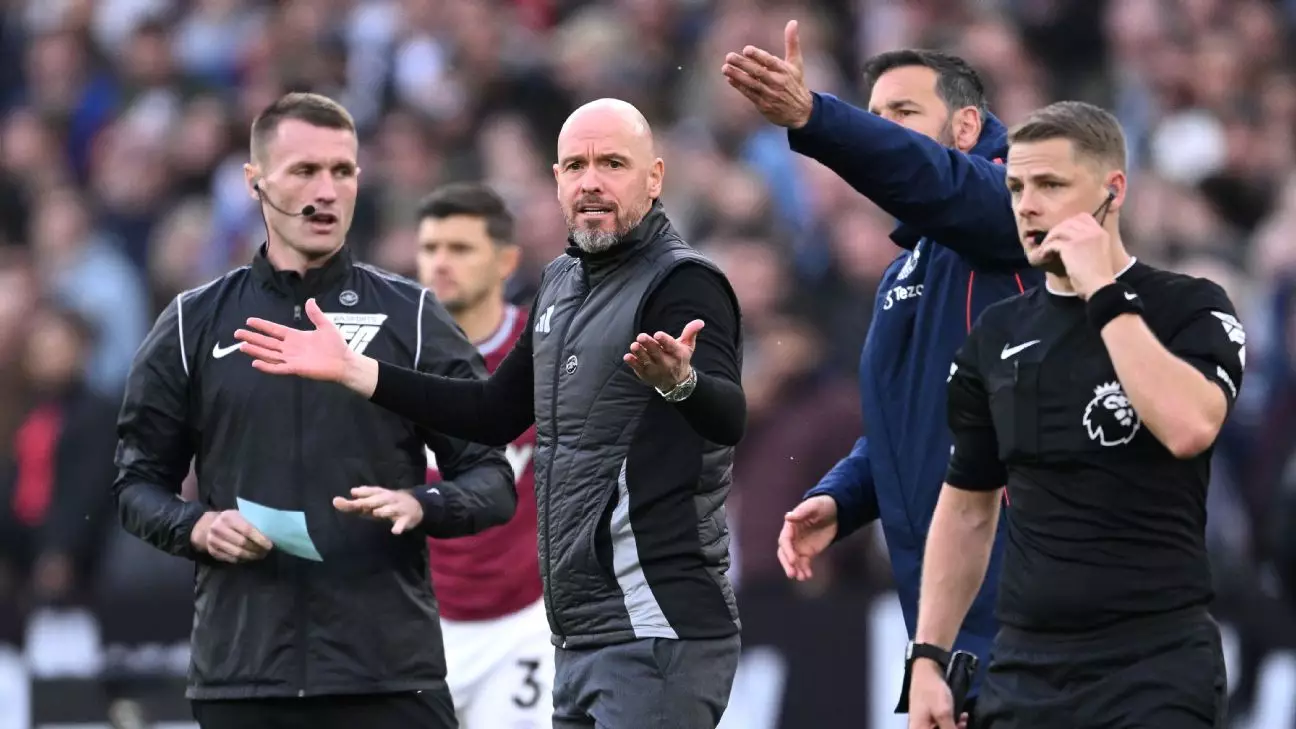The advent of Video Assistant Referees (VAR) has stirred heaps of debate surrounding the integrity of officiating in football, especially in high-stakes leagues like the Premier League. Notably, the recent incident involving West Ham United and Manchester United has underscored some of the contentious issues that surround VAR’s role in football officiating. Howard Webb, the chief refereeing officer of the Premier League, publicly acknowledged a significant error that stemmed from a VAR intervention in this particular match, which might have far-reaching implications.
The conflict arose during the match on October 27, 2023, when West Ham faced off against Manchester United. In a situation that stood at 1-1 during the dying moments of the game, a clash between Matthijs de Ligt and Danny Ings resulted in a penalty awarded to West Ham, following a decision made by VAR official Michael Oliver. At first glance, the scene appeared to be a potential foul, igniting a series of questions regarding the clarity of officiating standards.
Webb’s admission regarding the misjudgment in awarding the penalty speaks volumes about the evolving relationship between technology and human refereeing. He characterized the VAR’s decision-making as being “uber-focused” on the interaction between the players, neglecting the context that should dictate such calls. His assertion emphasizes a critical aspect of VAR—a system designed to support officiating, yet one that can falter when over-analysis leads to misinterpretations of the rules.
Furthermore, the repercussions of this decision resonated beyond just the goal itself; it subsequently contributed to Erik ten Hag’s dismissal from his managerial role at Manchester United. Ten Hag had already been grappling with a tumultuous season, and this latest defeat served as the tipping point for management, leading to Ruben Amorim’s swift appointment as his successor.
Webb’s insights raise larger questions about the efficacy and reliability of VAR procedures. Lamentably, the inconsistency in officiating decisions has left fans, players, and managers alike discontent. Not only does this uncertainty threaten the game’s aura of fairness, but it also places undue pressure on referees burdened by the fear of VAR-driven scrutiny.
Moreover, Webb’s discussion about VAR’s limitations was not restricted only to the West Ham vs. Manchester United match. He also addressed another incident involving Arsenal’s William Saliba, where he felt a clear failure occurred in upholding necessary standards. The VAR’s successful intervention in that case illustrated a contrasting facet of its capabilities—when strategically employed to rectify misjudgments, it can indeed function effectively.
As the Premier League grapples with VAR’s myriad implications, the distinct outputs of these contrasting incidents—the awarded penalty and the overlooked red card—underline the necessity for further education and training for officials in navigating VAR protocols.
Analyzing the Broader Context: The Premier League and VAR’s Future
This current season has evidently placed VAR under scrutiny, especially in light of the Premier League’s Key Match Incidents Panel, which has reported only three significant VAR errors thus far—compared to last season’s dismal tally of 13 by this stage. This drop can be indicative of either improvement in officiating or a more confounding manifestation of confusion inherent in football today.
Moreover, the two other notable incidents this season, which included a wrongly disallowed goal for Bournemouth against Newcastle and a missed red card for Bruno Fernandes against Tottenham, further highlight the delicacy and complexity of implementing VAR. Thus, not only are players and managers facing challenges on the pitch, but officiating crews are tasked with navigating this evolving landscape equipped with only partial success.
As we look to the future of VAR in the Premier League, it becomes imperative to strengthen the training framework for officials, ensuring that technology serves its intended purpose. By refining the standards of how VAR is used, the Premier League can help restore confidence among stakeholders. The call for transparency about VAR decisions and improving communication from officials to fans will also aid in bridging the ever-widening gap of trust witnessed in recent years.
While the integration of VAR in football has brought about promises of fairness and accuracy, its successful implementation hinges on the collective adeptness of players, referees, and technology working harmoniously rather than in pronounced discord. The journey may be fraught with hurdles, but with a conscientious focus on improvement, the ultimate goal of fostering integrity in the beautiful game remains achievable.

